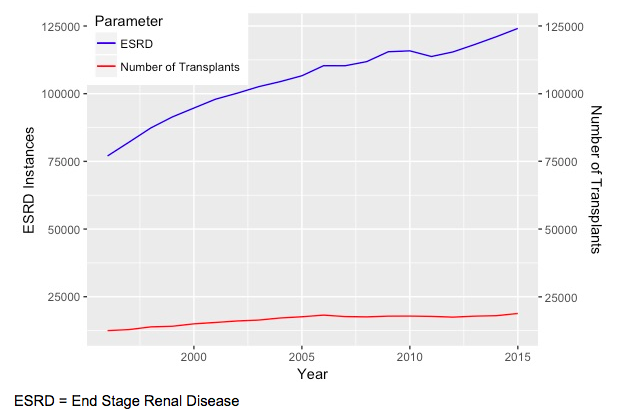Last week, the Organ Donation Clarification Act was released by Rep. Matt Cartwright (D-PA) with 14 cosponsors. The bill would clarify the National Organ Transplant Act’s (NOTA) definition of “valuable consideration,” making it clear that donors can be compensated for medical expenses and lost wages. It would also permit the U.S. government to run pilot programs to test the viability of noncash rewards to incentivize donors. And now this week, Rep. Tom Rice (R-SC) has announced a set of amendments to NOTA that seek to orient the Health Resources and Services Administration toward increasing organ procurement, rather than simply distributing an inadequate supply.
Both are important contributions to what should be a national discussion: How do we address the growing shortage in kidneys? Yet with the population aging and the number of transplants flatlining, the kidney shortage has reached crisis levels, demanding we take even bolder steps.

Source: United States Renal Data System
Keeping someone on dialysis costs upwards of $87,000 per year, while the estimated “market clearing price” for kidneys is closer to a one-off cost of $25,000-$50,000. Given that Medicare spends nearly 7 percent of its budget treating kidney disease, tackling the shortage presents a clear opportunity to save lives and taxpayer dollars simultaneously. If Congress wants to get serious about addressing the kidney shortage, it should consider legislation that exempts Medicare from NOTA’s limitations altogether. This would allow the creation of a Medicare “Heroism Award Program” to provide significant cash grants to donors, above and beyond lost wages or expenses. The savings would be so great that Medicare could easily reimburse the expenses for a public event celebrating the donor’s sacrifice. The concept of a “heroism award” comes from economists Muriel Niederle and Alvin Roth, who argue that framing the grant as a prize rather than a payment can help to bypass our psychological repugnance toward donor compensation more generally.
But why does a place like the Niskanen Center care about donor compensation in the first place?
It stems from what our Vice President of Research Will Wilkinson has dubbed the “Rawlsekian” approach to social policy, referring to a philosophical fusion of John Rawls and F.A. Hayek. From Rawls we get a concern for distributive justice, based on the notion that economic systems must win the buy-in of society’s least advantaged. From Hayek we get a love for the rule of law, markets, and decentralized, evolutionary social systems. And from both, we get a deep respect for individual liberty, economic rights as human rights, and a skepticism of “perfectionist” laws that would force others to adopt a contested view of the good life.
While this may sound abstract, it lives and breathes in our work, including our successful push to legalize compensation for bone marrow donors. Simply put, laws prohibiting the buying and selling of organs are an affront to personal autonomy and distributive justice simultaneously. On the demand side, would-be recipients tend to be marginalized populations for whom matching donors are harder to come by. And on the supply side, would-be donors who could use the extra income (as seen in the case of low-income plasma donors) are blocked from exercising their individual autonomy due a vicarious concern for their exploitation. Indeed, beneath the surface of arguments against buying and selling organs — that it violates “human dignity,” for example — is more often than not a deeply perfectionist view of the good life, as demonstrated by the number of compensation opponents who write from contested religious, Aristotelian or communitarian perspectives.
At the same time, the Niskanen Center’s overall mission eschews ideal theories in favor of pragmatic policy change. Thus, as much as I’d love to see someone like Al Roth appointed as the organ transplant czar, with a mandate to design an optimal market in organs, politics is a long game of persuasion and compromise. That’s why the two new bills from Reps. Cartwright and Rice remain immensely important, even if they don’t nearly go far enough.